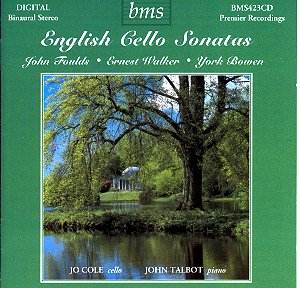A few months ago a young cellist stated on the
radio how few works there were for the cello. As a devotee of
the cello repertoire I know this to be untrue as,according to
my researches,I have listed well in excess of a hundred substantial
works by well known composers; more than enough for any performer’s
portfolio. Maybe, when compared to the violin repertoire, the
number of works for the cello do take a back seat but there is
clearly something there for all tastes. A young cellist could
do worse than listen to and study these cello sonatas by the three
relatively unknown English composers: Foulds, Walker and Bowen.
These rarely played compositions, all of which are receiving their
premier recordings, prove to be interesting and satisfying works
and are most welcome additions to the cello repertoire.
The first work on this BMS release is the inventive
and melodic cello sonata from John Foulds, which he conceived
as early as 1905. Foulds was a professional cellist and aged 20
became a player with the Hallé Orchestra. Owing to his
connections in the music world Foulds could boast meetings with
the eminent composers Busoni, Mahler, Strauss, Delius, Bartók
and Humperdinck. The cello sonata is said to have a high reputation
which is not borne out by the small number of performances it
has received. In fact, music writer Malcolm MacDonald classed
this work as one of the finest, if not the finest, cello
sonata by an English composer. In my view the Foulds sonata does
contain some very fine moments especially in the lyrical second
movement Lento but is inconsistent in quality and is certainly
not in the same league as the sonatas by Delius, Ireland, Moeran
and Bridge, for example. The Lento is a fascinating movement
where Foulds displays his earliest use of quartet tones. To be
frank Foulds’ invention took me by surprise as I momentarily thought
that the cellist was tuning-up at my first hearing of the work.
Ernest Walker, a pianist and organist
worked for the majority of this life as a music educator and author
at Oxford's Balliol College and is a name that I am unfamiliar
with. I found the cello sonata pleasant, extremely interesting
and emotionally restrained but rather disappointing overall. This
contrasts with Ivor Keys’view in The New Grove who stated: "The
cello sonata combines passion and harmonic adventure." I
did enjoy the central slow movement Adagio where Walker
achieves some moments of real calm and serenity. The mood is predominately
lyrical and rhapsodic but without that telling melodic expression
and I feel that the work will continue to struggle for performances.
York Bowen can do no wrong for me at the
moment and I am consistently impressed by the quality of his compositions
that have finally made it to the recording studio. This cello
sonata is out of the top drawer and I am amazed that this work
is not a staple of the cello repertoire. As I have come to expect
from Bowen, the sonata is often tender, melodic and shamelessly
romantic in mood. Bowen's chamber music is extremely distinctive
in style and the cello sonata is no exception. Here the piano
part dominates and the brilliant writing could be from a Rachmaninov
or Albeniz piano concerto. The highlight of a fine work is the
final movement Allegro con fuoco, which demands
to be heard. Unfortunately the technical difficulties seem to
stretch Cellist Jo Cole beyond her limit at times.
Although I am not familiar with it, there is
an alternative version of the Bowen cello sonata from the soloists
of the Endymion Ensemble, from a release of Bowen chamber music
on Dutton CDLX7120. The booklet notes on this BMS disc states
that all these works are premier recordings, so I can only guess
that they were recorded before the Dutton version.
Royal Academy of Music trained cello soloist
Jo Cole clearly loves these works and gives energetic and enthusiastic
performances. Frequently I wondered about the tuning of Cole's
instrument. I'm sorry to report that I found her tone unpleasant
at times, especially in the middle to higher registers. On several
occasions she seemed to really struggle technically. It made me
wonder how these sonatas would have sounded in the hands of a
heavyweight cellist. The pianist John Talbot gives committed performances
and consistently takes the lead; even dominating the proceedings
at times. The piano I do not feel is heard to its best advantage,
owing to Talbot's overuse of the sustaining pedal, particularly
in the Foulds sonata. Furthermore, there is an over-reverberant
acoustic, again particularly noticeable in the Foulds, a phenomenon
which I have also experienced with another BMS recording.
It is suggested that owing to the generous length
of the CDs playing time there could be a problem with ejecting
the disc from the CD player. I can report experiencing no such
problems.
Reservations aside, collectors of English chamber
works are urged to hear these interesting works; especially the
Bowen.
Michael Cookson
The British
Music Society
